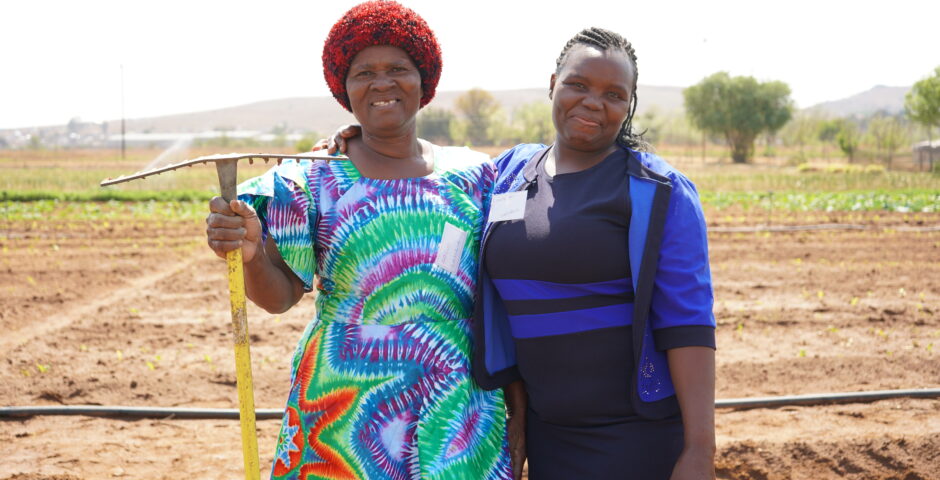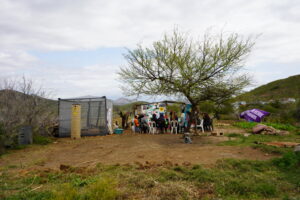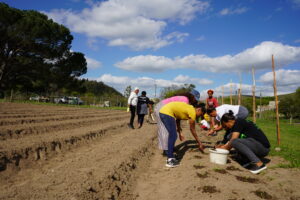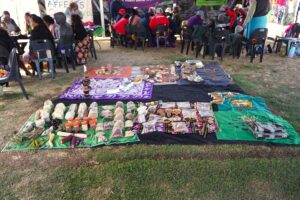
Travel report
Visiting Rural Women’s Assembly in South Africa
Amanda, Jette and Lea from GA just returned from a project visit with Rural Women's Assembly in South Africa. Read Amanda's report from the trip here.
Kategori: Global Aktion, Klima & Miljø, Klimakamp, Klimaretfærdighed, Landbrug, Madsuverænitet, News in English, Sydafrika
Together with Lea and Jette from the Feminist Agroecology Group, I went to visit the Rural Women’s assembly in South Africa in the end of September and start of October. The visit is part of our new project Forward to Feminist Agroecology: The Power to Feed Ourselves is in Our Hands, which started this summer with funding from CISUs Civil Society Fund. Read more about the project here.
The purpose of the visit was to get better acquainted with our partners in the Rural Women’s Assembly, including their strategy, approach, methods and target groups. Rural Women’s Assembly is a network of rural women’s movements, assemblies, organisations and chapters of mixed peasant unions, federations and movements, that organises rural communities across the SADC region around struggles for feminist agroecology, food sovereignty, climate justice, and rural women’s rights.
During our visit we went to see some of the activities that Rural Women’s Assembly are organising around South Africa and meet the people that participate.
Seed saving in Zolani

Study circle in the Zolani youth hub
Our first visit was to the township Zolani in the Western Cape, where a group of local young people recently occupied a piece of land and established a youth hub. The space is used both to produce food following agroecological principles, but also as a learning site for study circles of young women from the community. Local study circles are one of Rural Women’s Assembly’s key activities and will also play an important role in our project together. The study circles are facilitated by local women who have been trained within agroecology and feminist leadership, and serve as a space for these women to share their knowledge and practices with other women in their communities.
On the day we visited, the farmer Elsie shared her knowledge and experiences with seed harvesting and seed saving, which is a key issue within agroecology and food sovereignty. Many rural women and small scale farmers struggle with commercialisation of seeds, such as GMO, biofortified, and hybrid seeds, because such seeds cannot be replanted. This means that the women need to purchase new seeds every year, building up debts that they cannot repay. Using indigenous seeds, that can be saved and replanted, makes farmers more independent. In addition, it is better for the environment in the long term. For this reason, using and saving indigenous seeds is a central practice within feminist agroecology.
Intercropping in Suurbraak
Our second visit was to another small settlement in the Western Cape, Suurbraak. Here we visited the Suurbraak Aquaponics where a local farmer has set up a complicated system using water and rocks to grow lettuce, tomatoes and other crops. The Suurbraak Aquaponics is also used as a learning site by Rural Women’s Assembly, gathering local women in study circles to learn about agroecology and feminism. During our visit, we got a tour of the aquaponic facilities and helped a group of local women with planting pumpkin and maize together in a field connected to the site.

Planting pumpkin and maize in one of RWA’s learning sites
Intercropping, or companion planting, is another central practice within agroecology that aims at using the available resources more efficiently by promoting complementarity between species, for example in to increase yield or quality, or to keep away pests and diseases. One of the well-known combinations of plants is called “the three sisters”: Squash or pumpkin, maize and climbing beans. The practice of planting these three plants together derives from indigenous people in what we know as North and Central America. When planting squash, maize and beans together, the bean contributes by fixing nitrogen in the root nodules of the maize, stabilising the stalk of the maize which the bean can climb on. The squash contributes by creating soil cover, shading the ground, keeping the soil moist, creating photosynthesis and preventing the establishment of weeds around the roots of the other plants. In this way the three crops support each other.
Feminist Agroecology School
During the last part of our trip, we participated in Rural Women’s Assembly annual Feminist Agroecology School outside of Johannesburg. At the Feminist Agroecology School, more than sixty women from across ten different countries gathered to learn about climate change, feminist agroecology and food sovereignty, and to share their own knowledge and practices of agroecology with each other.

The participants of the FAE school brought some impressive collections of seeds
Every morning the women would start the day by occupying the space, laying out their seeds, which they brought with them from their home countries, on beautiful scarfs and political banners in the middle of the room. Afterwards, one of the country groups would conduct what is called a Mystica, where the women celebrate their spirituality and connection to nature through collective meditations, creative exercises, movement practices, and more. Then the programme would start, consisting of lectures on themes such as feminist agroecology and climate justice, workshops on seed saving or composting, and practical work in the fields. And whenever there was a small break in the programme, the women would break into song and start dancing, singing about struggling together against oppression and fighting for freedom and justice.
The space that the women created together at the Feminist Agroecology School was very special, and we felt very honoured to be welcomed into it. We have returned to Denmark with a lot of new knowledge and inspiration which we are looking forward to sharing with others. If you want to hear more about our trip, join us for Activist Tuesday on the 5th of November from 18.00, where we will report from our trip.
If you are interested in joining the Feminist Agroecology Group, you can write to me on amanda@globalaktion.dk